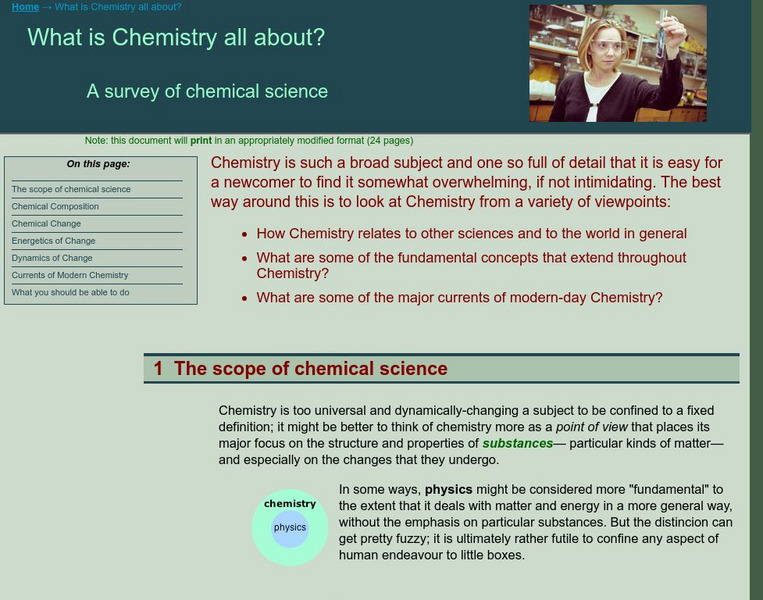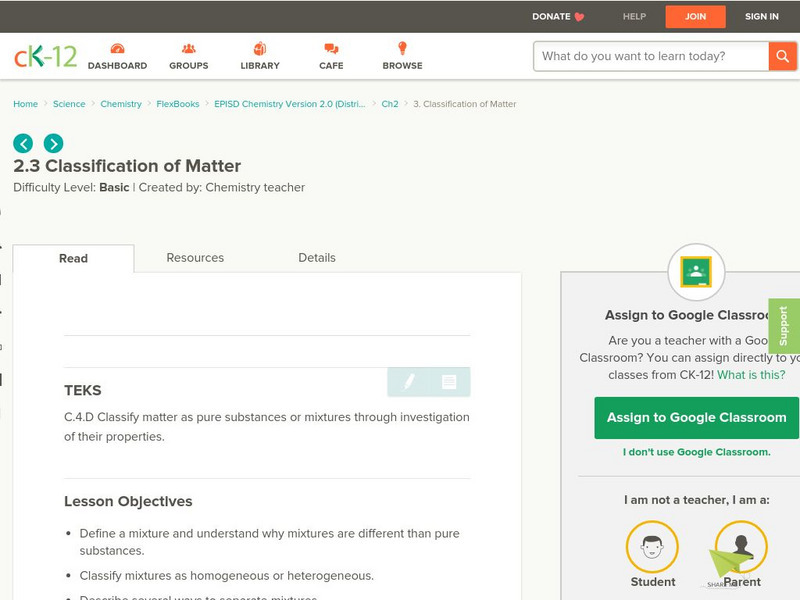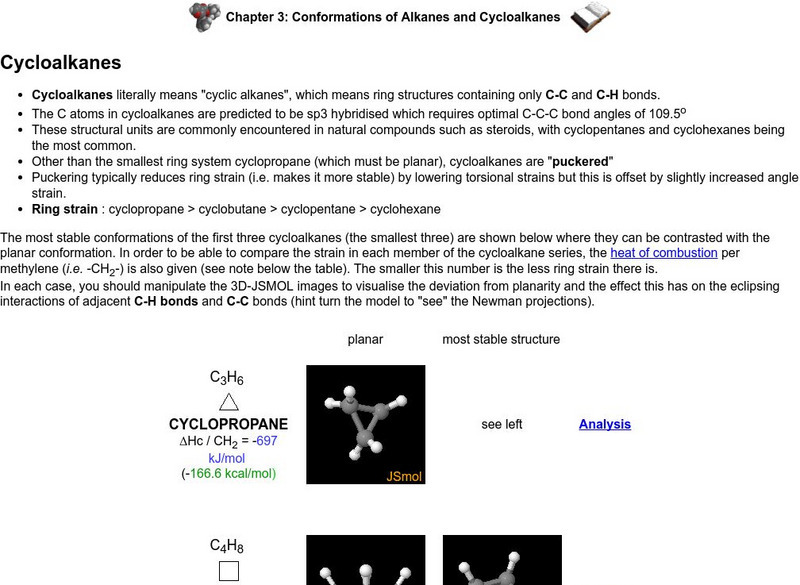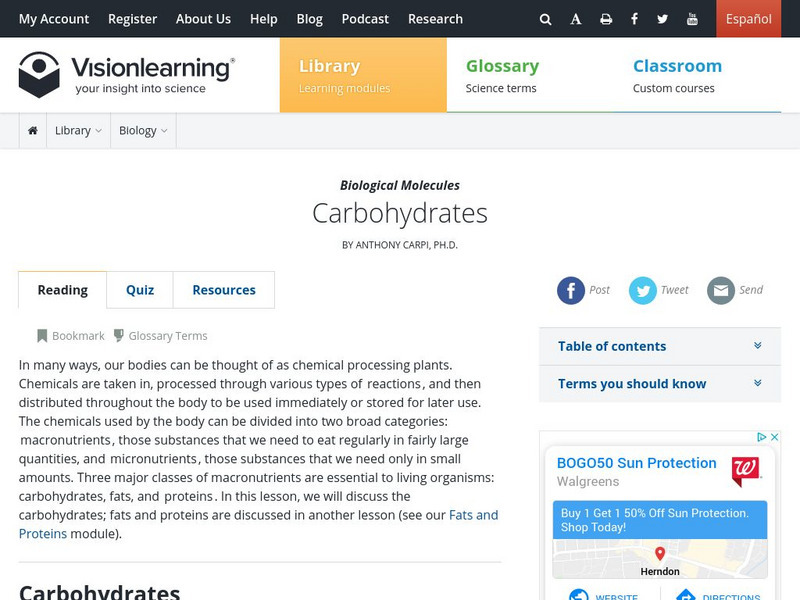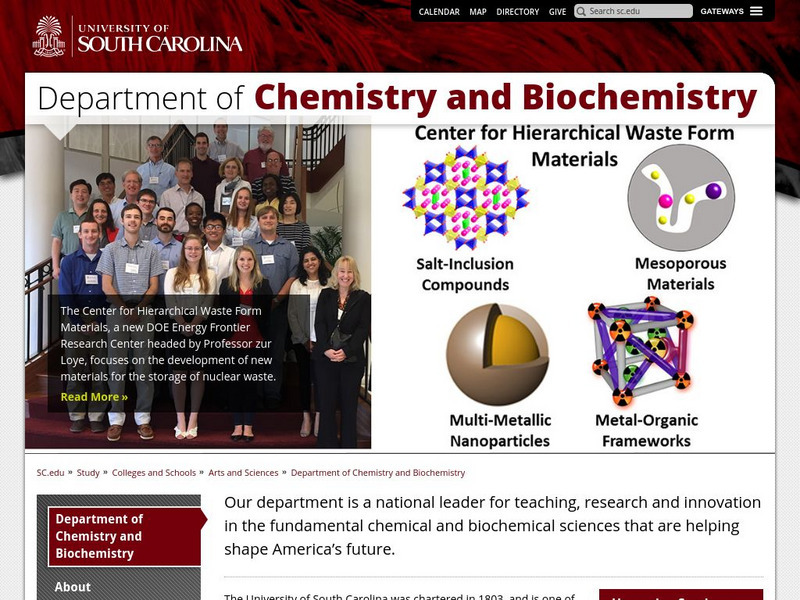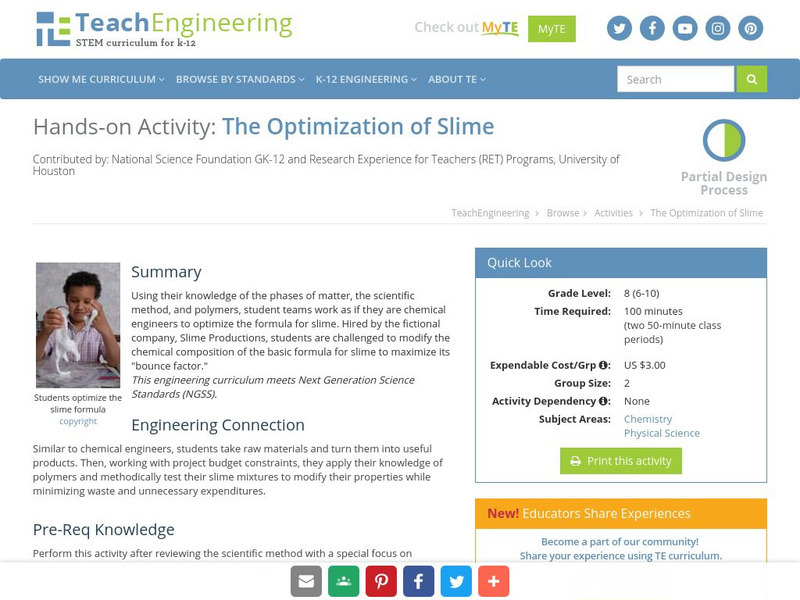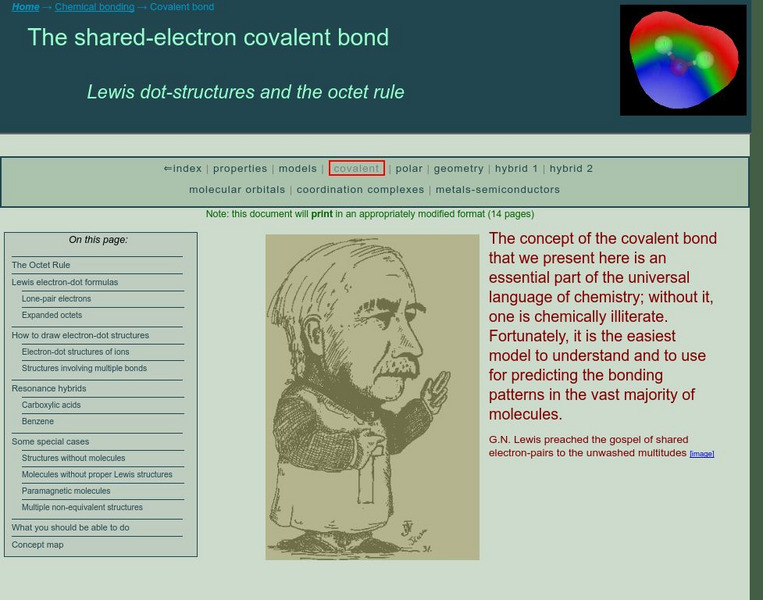Texas Instruments
Texas Instruments: Common Molecules
Students use StudyCards to practice matching compounds with their chemical formulas.
Alabama Learning Exchange
Alex: Rolling, Rolling, Rolling
This activity allows students to review their knowledge of monatomic and polyatomic ions. After rolling the ion dice, the students will write the correct chemical formula and name for the compound "rolled".This lesson plan was created as...
Simon Fraser University
Chem1 Virtual Textbook: Dynamics of Chemical Change
Dynamics of chemical change is a section of a larger overview on Chemistry, which covers a variety of aspects. This particular section focuses on kinetics and mechanism, kinetics, and catalysts. Examples, formulas, and pictures are...
BBC
Bbc: Gcse Bitesize: Monitoring Chemical Reactions
This lesson focuses on percentage yield including what it is, the formula for calculating percentage yield, a sample calculation, and a link to a test.
BBC
Bbc: Gcse Bitesize: Chemical Calculations
You should be able to calculate the masses of reactants and products from balanced equations, and the formula of a compound from information about reacting masses.
Carnegie Mellon University
Chem Collective: Stoichiometry Bridge Course
This is a complete course in chemical stoichiometry, set in a scenario that shows how stoichiometry calculations are used in real-world situations. This course has been designed to not only help you strengthen your skills with...
CK-12 Foundation
Ck 12: Hydrocarbon Rings
[Free Registration/Login may be required to access all resource tools.] In this module, students will explore cyclic hydrocarbons, and explain how ring strain contributes to the shape of cyclic hydrocarbons. They will also name and write...
ClassFlow
Class Flow: Ionic Bonding & Ionic Compounds
[Free Registration/Login Required] Ionic Bonding & Ionic Compounds - Objective - compare and contrast chemical formulas for ionic & molecular compounds.
CK-12 Foundation
Ck 12: Classification of Matter
[Free Registration/Login may be required to access all resource tools.] In this online tutorial students will define a mixture and understand why mixtures are different than pure substances. They will classify mixtures as homogeneous or...
ClassFlow
Class Flow: Compounds and Molecules
[Free Registration/Login Required] This flipchart introduces fifth graders to compounds and molecules. It is part of a large unit on matter. Key concepts include compounds, molecules, and chemical formulas. Opportunities for student...
Chiral Publishing
Chiral Publishing: An Introduction to Chemistry: Binary Covalent Nomenclature
Quiz yourself on binary covalent nomenclature with this interactive animation. Convert formulas to names or names to formulas while learning some common compounds.
Alabama Learning Exchange
Alex: Writing Word Equations
The students will learn to write word and formula equations. We will watch a web video about chemical equations. We will then complete the science in motion lab "The Color of Chemistry". The students will also be required to write word...
University of Calgary
Univeristy of Calgary: Cycloalkanes
A brief description of cycloalkanes. Properties, chemical make-up, and structure provided. Brief introduction to nomenclature of cycloalkanes and generic formula. Interactive piece requires x-pdb plug-in.
Science Education Resource Center at Carleton College
Serc: Combustion or Oxidation
Students burn a magnesium strip to reinforce the concepts of chemical vs. physical changes, reaction types, conservation of mass, formulas and equations, stoichiometry, Lewis structures, and to explore the concept of oxidation/reduction...
Sophia Learning
Sophia: Ionic Compounds: Binary Compound Names With Transition Metals: Lesson 4
This lesson will demonstrate how to write a chemical formula for a binary ionic compound that includes a transition metal. It is 4 of 4 in the series titled "Ionic Compounds: Formulas from Binary Compound Names with Transition Metals."
Virginia Tech
Types of Equations
After learning about and reviewing the types of chemical equations and rules for balancing, students can practice balancing equations on interactive quizzes.
Simon Fraser University
Chem1 Virtual Textbook: Chemical Composition
Chemical composition is a section of a larger overview on Chemistry, covering a variety of aspects. This section focuses on elements, atoms, compounds, and structure. Examples, formulas, and pictures are provided.
CK-12 Foundation
Ck 12: Acids and Bases
[Free Registration/Login may be required to access all resource tools.] In the following online tutorail students will define acids and bases in terms of the ions that are produced when each type of compound is dissolved in water. They...
Vision Learning
Visionlearning: Biological Molecules: Carbohydrates
An explanation of why carbohydrates are important nutrients for the human body. Chemical formulas and structures are used to demonstrate simple and complex carbohydrates.
Other
Chemical Bonds: Writing Lewis Structures
This slide show explains the rules for writing Lewis structures and then demonstrates an example. It then provides a practice example for the student to try.
Chem Tutor
Chem Tutor: Chemistry: Compounds
This lesson focuses on chemical compounds including Ionic and Covalent Bonds, Valences, Lewis Structures, Binary Covalent Compounds, Radicals or Polyatomic Ions, and much more. It also includes a compound worksheet in which the students...
TeachEngineering
Teach Engineering: The Optimization of Slime
Using their knowledge of the phases of matter, the scientific method, and polymers, student teams work as if they are chemical engineers to optimize the formula for slime. Hired by the fictional company, Slime Productions, students are...
Simon Fraser University
Chem1 Virtual Textbook: The Shared Electron Covalent Bond
The General Chemistry Virtual Textbook, or Chem 1, is broken into several sections covering various aspects of topics related to chemistry. This section deals with the shared-electron covalent bond and related topics such as the octet...
TeachEngineering
Teach Engineering: Common and Natural Logarithms and Solving Equations
Students continue an examination of logarithms in the Research and Revise stage by studying two types of logarithms--common logarithms and natural logarithm. In this study, they take notes about the two special types of logarithms, why...
Other popular searches
- Writing Chemical Formulas
- Naming Chemical Formulas
- Ionic Chemical Formulas
- Balancing Chemical Formulas
- Balanced Chemical Formulas
- Wrriting Chemical Formulas
- Chemical Formulas Worksheets




